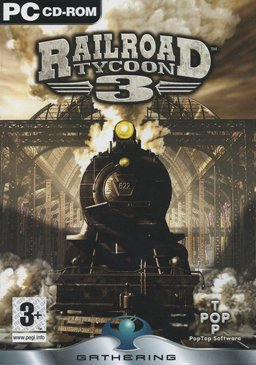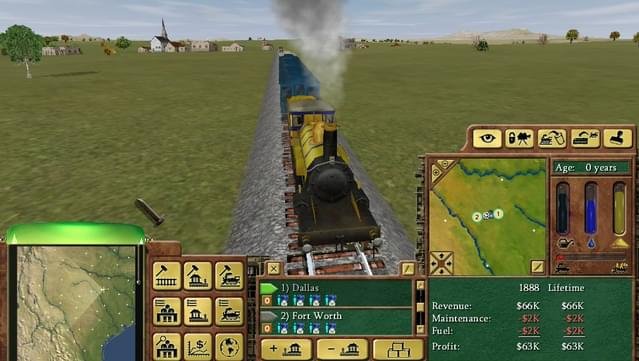Railroad Tycoon 3: Texas Tea and Educatin’
I may have mentioned before that, as of this writing, I’m 34 years old which means I have been alive during an incredible period of speedy, almost cartoon-roadrunner-like velocity development in technology. I’ve been alive long enough to see the iPod be announced and then just as quickly disappear by the time the new iPhone 15 is unveiled. I’m living at a time when self-driving electric cars are not just a possibility, but one of the announcements of a quarterly expo for vehicle manufacturers. I’ve seen videogames shift from cartridge-based console systems to digital stores filled with games. And, importantly for this essay, I’ve lived through the period that saw the personal computer movement steadily shift from heavy brick towers run on floppy discs, to becoming slick beacons of design that can fit in your pocket or rest on your desktop.
It’s incredible to consider then that my experience with PC games has largely been based on software released 20 years ago.
Growing up my parents, like a lot of folks in the early 90s, had a personal computer. They used it almost exclusively for utilitarian reasons: managing their pest-control company either through record keeping spreadsheets or drafting invoices. My parents understood that this technology could be a great learning tool for my little sister and I and so, like the good parents they are, they bought computer games for us to play when Dad wasn’t making invoices (or playing solitaire). These were almost always cartoony puzzle solvers like Dr. Brain or Lil’Howie’s Funhouse, games that were fun to play and managed to sneak in lessons about grammar, mathematics, and pattern recognition.
And, to be fair, Lil Howie’s Funhouse was a jam.
It also had Maurice LaMarche doing multiple voice over roles. I mean, come on man, that dude was Mr. Freeze and Lurr, Ruler of the planet Omicron Persei 8. Nuff said.
As time went on though I began to gravitate more and more towards real-time strategy games because they were often cheaper than console games and they also had cool history stuff that I could learn about. Railroad Tycoon 3 appeared in my life sometime between Stronghold Crusader and Rome Total War, and I inhaled the game.
It’s something of a mystery to me why the game appealed to me as much as it did. Unlike Zoo Tycoon which allowed me to make parks filled with animals(and dinosaurs in one DLC that was a precursor to contemporary DLC packages) or Roller Coaster Tycoon which allowed me the chance to kill guests with unfinished roller coasters after charging them $30 to use the bathroom, Railroad Tycoon 3 was just building railroads. There was a brief period in my childhood when I liked trains a lot, enough to get a small model train for Christmas, but after that I’ve never been a “train-person.” I’ve never made model train sets, I don’t participate in model train subreddits(which are totally a thing), and I couldn’t tell you the names of specific engine models if you put a gun to my head. These are facts about me, as is the fact I spent hours playing Railroad Tycoon 3, and specifically the scenario “Texas Tea”.
Railroad Tycoon 3 is, obviously, the third installment in a series of games released by PopTop Software. That company would be purchased by TakeTwo Interactive in July of 2000, and that in turn would be acquired by 2K which would eventually close PopTop by merging it into Firaxis studios. In terms of gameplay, Railroad Tycoon 3 is a construction and management simulator video game, meaning that players are challenged to establish businesses and then use the capital they begin with to construct railways across various regions around the planet and hopefully generate enough revenue to build more railways.
This is, despite sounding tedious, a bit of a challenge.
Texas Tea begins in the year 1888, though the player can decide any year to actually begin the scenario. Once a date is chosen, the player is given the option to determine how much initial capital they will have, and from there is encouraged to reach certain goals. One of these is to connect the cities of Houston, Austin, Dallas, Ft. Worth by rail, and the other goals include having company profits at a particular six-figure amount, and a personal income of similar quantity. This is a good opportunity to point out that technically the player assumes a fictional persona of an aspiring railroad magnate, the implication being that all in-game events are part of a story.
To be completely honest, I never cared about this story at all. It was far more enjoyable trying to build a company and cover Texas in railways.
That’s another way of saying it was far more enjoyable being a capitalist stooge.
Texas Tea was, in my experience, the most rewarding level in Railroad Tycoon 3 because the technology of the engines was such that moving cargo was faster and easier, and also because I was able to connect cities I recognised (and lived in) together. Reading some forum posts from players (some of which were still being posted only a few months previous to me writing this essay), I wasn’t alone in this. Building railroad lines between cities was seemingly the preferred strategy, but almost 20 years after playing the game I discovered some players didn’t even bother with this. Some chose instead to read in-game maps to determine what resources were moving and in what direction and establish stations there. The idea that I could have set up stations in the middle of nowhere to have trains move shipments of iron, cattle, or lumber, etc left me…well, I was bumfuzzled. And the fact that there were still people talking about the game, and discussing strategy revealed a great lesson about the medium of video games.
The appeal of Railroad Tycoon 3, and the reason why it continues to be played by dedicated fans of the series is because it provides the simulation of management. Working off of the similar structure of Sid Meier's collection of city and nation building titles like Civilization, Railroad Tycoon 3 managed to recreate the experience of beginning with an original investment and then providing the player with tools, and challenges, to test their ability to manage resources, assess certain variables, and then make actions by constructing railroads to try and establish a functioning business. The player isn’t even limited to railroads as there are options to purchase various manufacturing centers such as textile mills, slaughterhouses, dairy farms, steel mills, cattle farms, lumber yards, and of course Oil wells.
The key to “winning” in Texas Tea is oil. I learned that by living in Texas all of my life, and also by playing that region in Railroad Tycoon 3 well over twenty times.
It’s not just because it’s Texas that you have to buy oil, it’s because after a period of time oil becomes a key commodity. At some point in the game a newspaper informs the player that children no longer want wooden toys they want plastic toys, so whoever owns the oil wells will have the resources for refining raw oil into petroleum and then ultimately plastic development, and finally the resources for a toy factory. Oil is a great resource to have on its own, but in a land as big as Texas the player learns that if you want to win, you should invest heavily in black gold, texas tea.
And of course, you should probably also build some railways at some point.
This is all to say that Railroad Tycoon 3 taught me basic business and economics. Which leads to the question, is Railroad Tycoon 3 an educational game?
There has been, and continues to be conversations about the educational merit of videogames as a medium. And while a number of voices continue to decry videogames as a waste of time, there are just as many brave, and intelligent people, who argue quite effectively that videogames not only have merit, but tremendous possibility for education. Some great examples would be the following TED talks found online while research this article How Video Games Can Level Up the Way You Learn by Kris Alexander, Your brain on video games by Daphne Bavelier, and Dear Parents, This is Why You SHOULD Let Kids Play Video Games! by Avery Eun.
Educational games have suffered due to the fact, and let’s be clear here, they suck.
Okay that’s harsh. But not untrue.
Most educational games in the past were made largely to silence or temporarily shut up critics who complained there were no educational options for young videogame players. Given the fact that most of the early production companies of video-games were made by engineers with no background in education who were more concerned with making profits it’s no wonder that a number of the early efforts to make educational games were not only not engaging, they were also not fun.
Texas Tea and Railroad Tycoon 3 were an educational experience as much as they were entertainment because while I played the game, enjoying the bluegrass harmonica background music while I laid down tracks through El Paso, I was given a chance to observe history and economics at play. One structure of the overall game is newspaper headlines which will announce world events as well as economic developments. Learning that children want plastic toys was a chance to observe how the economics of consumer feedback could drastically impact my business model, and also how that would determine in what direction I established train routes. Likewise announcements of company stock prices gave me the chance to see how investments can be driven by shifts in the market. My dad would help me figure out what my stock “splitting” would mean. The game would give me yearly economic reports which would also allow me to see how the company’s yearly profits were rising and falling, and how much of that profit that I could translate into investment capital for new rail-lines.
Obviously, I was, am, a nerd.
AND I’m a nerd who has a passing knowledge of how the stock market actually works because of a computer game about trains.
Railroad Tycoon 3 is fun. It’s a fun game that helped me learn. I don’t need any other reason to write about it. Video games are in a unique position culturally because the argument of whether or not they can be a tool for education is no longer relevant. They are, have been, and will continue to be one of a number of tools for educators moving forward. Looking at Railroad Tycoon 3 this way is not just an empty effort at nostalgia. If anything this was a reflective exercise in meta-cognition. The way I think about thinking about games is changing as I research more and more about the medium, and especially about the games I played growing up.
Establishing a foundation for the desire to learn is one of the most challenging aspects of education. Railroad Tycoon 3 helped establish that desire for me and countless other players. And it also taught me to wait until Mexico offers you a discounted price for setting up track lines in that country.
Coffee is a great commodity, but it ain’t gonna pay for all those tunnels to El Paso.
Joshua “Jammer” Smith
11.17.2023
Like what you’re reading? Buy me a coffee & support my Patreon. Please and thank you.
https://www.patreon.com/jammerdraws



